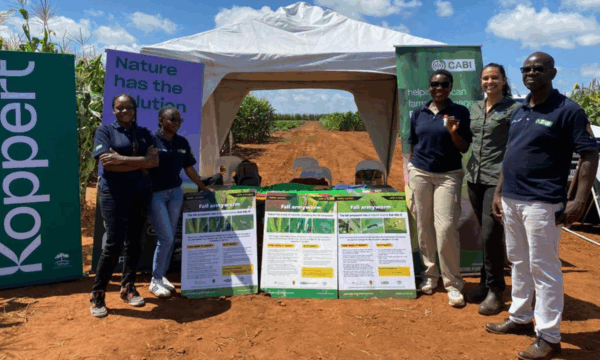
Zygogramma bicolorata, often referred to as ‘The Parthenium Beetle’ feeds on the leaves of Parthenium and is already being used as a biocontrol in a number of countries
Invasive species pose a serious threat to food security, biodiversity, water resources, human and animal health, and economic development. It is widely acknowledged that integrated control is the most effective strategy in managing invasive plants where it involves the use of herbicides, manual or mechanical control, and biological control agents in an integrated way. Last month, a short course on invasion biology and classical biological control of weeds was delivered at CABI in Pakistan.
The course, which was run by CABI scientists Philip Weyl, Corin Pratt, and Nikolai Thom, aimed to build a foundation in invasion biology and weed biological control in general. Additionally, with Parthenium a key focus species for CABI’s Action on Invasives programme in Pakistan, the course also introduced parthenium weed biological control specifically.
The main benefits of classical biocontrol are that the agents establish self-perpetuating, naturally dispersing populations and often establish throughout the range of the target weed, including areas which are not accessible for chemical or mechanical control. This makes control of the weed permanent with no negative impacts on the environment. The cost of biocontrol programmes is relatively low compared to other approaches and requiring only a one-off investment, and benefits can be reaped by many stakeholders independent of their financial status and irrespective of whether they contributed to the initial research.
A total of 35 participants attended the workshop, of which 28 were from organisations outside of CABI. They represented all provinces of Pakistan and ranged from PhD students and academic staff of renowned universities such as Faislabad Agriculture University, to extension officers working on the ground.

“The course was a huge success and I really feel that we were able to make people aware of the problem of invasions – not only weeds but all invasions – different management strategies, and most importantly classical weed biological control,” commented Dr Weyl.
Globally weed biological control has been completely successful in about 33% of cases which means that the target weeds have been totally suppressed by the agents themselves with no need for further chemical or mechanical control interventions. At a national level, success has been achieved in 83, 80, 61, 51, and 50% of biocontrol programmes in New Zealand, Mauritius, South Africa, Australia, and Hawaii, respectively. Classical weed biological control using specialist arthropod or pathogen agents from the native range of the target plant offers a sustainable, cost effective, long term solution for invasive alien weeds.
The goal of CABI’s Action on Invasives programme is to protect and restore agricultural and natural ecosystems, reduce crop losses, improve health, protect trade and reduce degradation of natural resources and protected areas. The programme has joined with Pakistan in a collaborative effort to control invasive species through an integrated pest management system, in which biological control will play an important role. The aim is to create a truly integrated and sustainable framework for tackling the problem of invasive species in order to generate growth, create jobs, and help reduce poverty. This is done by supporting local, national and regional activities for prevention, early detection, and control of invasive species. As part of these aims, this short course developed through the programme built a foundation in weed biological control in general, introducing Parthenium biological control specifically.
The workshop offered a valuable opportunity for Pakistani scientists and professionals to gain awareness of the efforts on a regional scale, as well as country-driven biocontrol activities to address not only Parthenium weed but all invasive weeds in Pakistan. “By the end of the course there was a marked difference in opinion with the vast majority of participants willing to conduct weed classical biological control,” concluded Dr Weyl.
CABI gratefully acknowledges the support of UK Department for International Development (DFID) and the Netherlands Directorate-General for International Cooperation (DGIS) whose funding contributions make Action on Invasives possible.
2 Comments
Leave a Reply
Related News & Blogs
CABI-led study suggests women in Pakistan need greater access to information on parthenium weed
A new CABI-led study investigated smallholder farmers’ knowledge, attitudes and practices towards parthenium and biological control in Pakistan. The study brings attention to important gendered aspects of parthenium impact. It also highlights smallhold…
27 June 2025





[…] Action on Invasives short course on classical weed biological control […]
[…] Action on Invasives short course on classical weed biological control […]